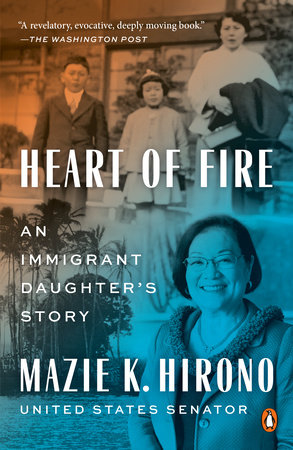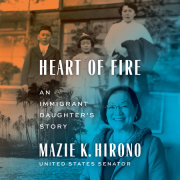PREFACE
Necessary Fire
In one of my most vivid childhood memories, I am sitting on the curb next to the bus stop with my older brother, Roy, waiting for our mother to get home. Three nights a week, after she leaves her day job as a typesetter at a Japanese‑language newspaper, she goes to work as a server for a caterer downtown. Roy is eleven and I am nine. Most days after school, we play in the street and climb trees with boys from the neighborhood until late, and then we wait at the bus stop. A soft evening breeze cools our flushed faces as we sit chewing wads of wax candy, pleasantly tired from our games. In the tree branches above us, roosting sparrows ruffle their wings, their chatter mingling with the occasional rumble of passing cars. I think how different the night noises are here in Hawaii, compared to the stillness of evenings in rural Japan, where I was born.
Roy and I jump to our feet at the sight of our mother’s bus turning onto Kewalo Street. We crowd around the door as it opens, knowing Mom will be the only passenger getting off at this hour. On this night, when Mom steps off the bus, she stumbles and steadies herself with a hand on Roy’s shoulder. She pauses, closes her eyes, and sucks in a deep breath. She looks pale and worn, and I realize she’s not feeling well. I watch her face closely as Roy and I walk slowly beside her to the white clapboard boardinghouse where we live together in a single small room.
As soon as we are inside, Mom changes out of her white server’s uniform and climbs under the sheets. She lies sideways across the mattress the three of us share, feet hanging off the side, careful to leave space for Roy and me. She refuses the bowl of rice that I have saved for her dinner and turns to the wall, a tiny moan escaping her. I touch her face. Her skin is on fire. I gather her clothes from the top of the dresser, where she has neatly placed them, and find that the cloth is soaked through. I try to appear calm, but I’m frightened. Roy stretches out next to our mother, watching her sleep, his forehead creased. I can tell he’s worrying, too. Not knowing what else to do, I walk to the communal washbasin at the end of the hall, carrying Mom’s uniform. Barely tall enough to reach the sink, I stand on a small step and drape the white cloth over the wooden washboard. I set about scrubbing the sweat stains from her clothes, working vigorously to distract myself from the fear that makes me feel hollow at the center. Mom has only one white server’s uniform and will need to wear it again for her next shift, later in the week.
I know how hard my mother works to keep us afloat, and I have already begun looking for ways to help her. Every day during the school year, Mom leaves two quarters on the table for Roy and me to buy lunch. A couple of times a month, she adds a dime for each of us. Roy always spends his dime, but I drop mine into the slot of a metal baseball piggy bank that Mom gave me. It is a cheap thing she picked up for a few cents, but I treasure it. In the evening before bed, I shake it, pleased by the jingle of coins. Some nights, I open the piggy bank and arrange the dimes in ever‑lengthening rows on the floor, enjoying the simple fact of them.
One evening a few weeks before, I shook my piggy bank, anticipating its jingle. But it made no sound. “I had to buy food,” Mom explained when she arrived home later that night. Where my saved coins had been, there was now only the heaviness of her regret. It chased my own disappointment away instantly. It had taken me many months to save those coins, but I understood that Mom had needed them. A few days later, she pressed a new coin in my palm. She folded my fist around it, smiling at me ruefully. The cool metal in my hand felt like a kind of promise as I pulled my piggy bank from under the bed and dropped the dime into its slot. Hearing its lonely clink, I knew there was nothing else to do but to begin saving again.
Now, I rinse Mom’s uniform and hang it to dry on a communal line in the yard. By the time I get back to our room, Mom and Roy are both snoring softly. I sleep fitfully that night, alert to Mom’s every movement and sigh. I’m half‑awake when she rises before daybreak as usual, dresses quietly so as not to disturb us, and leaves for her day job at the newspaper. After she’s gone, I lie there, staring into the darkness. Beside me, Roy rolls onto his back and softly exhales.
Even at that young age, I knew that there was no safety net to catch us should anything happen to our mother. Two years earlier, she had fled her unhappy marriage and brought us to Hawaii. We’d had to leave my three‑year‑old brother, Wayne, behind in Japan with my beloved maternal grandparents; he was too young to go to school, and there would be no one to take care of him while Mom worked. Wayne and my grandparents would be joining us soon, but in the meantime, our mother was all we had. A single parent, she worked two jobs for low wages, and if she couldn’t work, we didn’t eat. There was no question of her seeing a doctor, as we had no money for that, and no health coverage.
That childhood insecurity shaped the woman—and the public servant—I would become. It helped fuel my desire to study law and to position myself in rooms where I could advocate for those who were as vulnerable as our family had once been—as I had once felt. When, as a state legislator, I helped to pass laws that ensured safer working conditions and expanded health‑care cover‑ age for Hawaii’s families, I thought of my mother. When I advocated for public schools to have the resources they needed to serve all different types of learners, I thought of the teachers who had made a difference in my life— and those who hadn’t been able to help Wayne. And when, as a U.S. senator, I vociferously opposed the Trump administration’s cruel and devastating family separation policy, I thought again of my brother Wayne, who would carry the scars of a much gentler separation for the entirety of his tragically short life.
I have now spent five decades fighting for my constituents while also navigating old‑boy networks in the staterooms of Hawaii and in the House and Senate chambers of Washington, D.C., creating a place for myself in political arenas dominated by men. For the vast majority of that time, I strove to be polite and civil, even as I fought tenaciously for the causes I believed in. From my earliest days in the Hawaii legislature, I schooled myself to bite back the snappish retorts that sprang to my lips at the chauvinistic nonsense that re‑ mains an inevitable part of American politics, not to mention the hypocrisy of colleagues who speak one way behind closed doors and vote another way on the floor. Though this restrained civility had clear roots in the cultures I was steeped in—that of both Japan and Hawaii—it was not my underlying nature. But, given the expectations placed on women in politics, that we must be reasonable at all costs and never risk appearing to be overly emotional, it had seemed the most pragmatic approach to getting things done.
After the 2016 election, however, I found I could no longer censor myself. I began to let loose my frustration and anger at the forty‑fifth administra‑ tion’s appalling practices and policies, from tearing little children away from their desperate, asylum‑seeking parents, to unleashing the hateful violence of white supremacists, to disparaging war veterans, to packing the nation’s courts with ideologues. As I started publicly decrying in the strongest possi‑ ble terms the lawless president and those who enabled him, I was heartened to discover that this merging of my private and public personas was embraced by my constituents, as well as by the Democrats and progressives across this nation who shared my outrage. I haven’t stopped speaking my mind since.
In bringing us to the United States, my mother radically changed the trajectory of my life, making it possible for a daughter who might have grown up to marry a rice farmer in rural Japan to become the first Asian American woman and the only immigrant serving in the United States Senate. My deep emotional connection to my mother is the current that has driven my entire life. Everything I have achieved is a testament to her fortitude. It was her example that showed me how to stand up for myself, persevere, and not back down from a just fight. And it was her steady, loving presence that provided the secure base from which I could leap. Now ninety‑six and mostly bedrid‑den, my mother can no longer bear witness for herself, and so I have chosen to honor her by telling the story of the daughter she inspired to live boldly, and to fight with everything she is to make the promises of this nation a reality.
As of this writing on the eve of the 2020 presidential election, we stand at a crossroads, one that calls each of us to take action to preserve our democ‑ racy, to join in the fight against racial injustice, and to support one another through a global pandemic that has brought widespread grief, trauma, and the worst economic collapse since the Great Depression. The past four years have demanded that I become the most vocal and determined public servant I can be. In doing so—in becoming more fully myself—I have had to shed all the expectations others may have placed on me as an immigrant, a woman, and an Asian American. My deepest wish is that my story will inspire you to do the same, to become more fully yourself as you step into your own immense power, regardless of the circumstances into which you were born.
Copyright © 2021 by Mazie K. Hirono. All rights reserved. No part of this excerpt may be reproduced or reprinted without permission in writing from the publisher.











